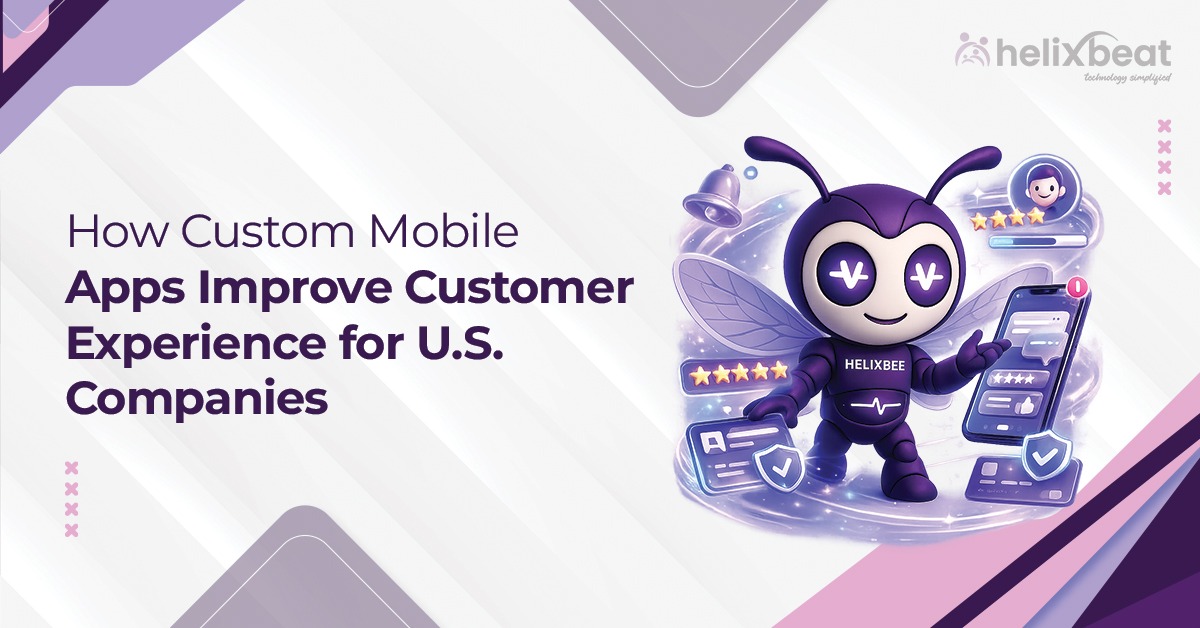What happens when a startup’s biggest asset—its speed—becomes its greatest vulnerability? That was the question facing a fast-growing healthtech company as it prepared for a national launch. Deadlines were tight, the pressure to deliver was intense, and bugs were slipping into production. Yet, they couldn’t afford to slow down. Their breakthrough? Partnering with the right Quality Assurance Services provider—Helixbeat.
Maintaining high-quality software while accelerating product delivery is one of the biggest challenges startups face, but it’s not impossible. With the right processes, tools, and team structure, it is absolutely achievable. This blog dives deep into how startups can maintain performance, reliability, and security—without sacrificing speed.

Table of Contents
Why Do Startups Struggle with Quality Assurance?
Rapid growth can be thrilling, but it often comes at the cost of stability.
When Speed Becomes a Risk
Startups thrive on agility. Teams ship fast, iterate fast, and pivot fast. However, this speed can compromise the rigor needed for thorough software quality assurance. Bugs may go unnoticed, features might not be tested across all environments, and user experience can suffer as a result.
The Cost of Not Testing Enough
Skipping testing might seem like a shortcut, but it usually ends up being a detour. A payment glitch or login failure can frustrate early users, driving them away forever. And let’s not forget the financial impact—fixing bugs in production costs significantly more than catching them during development.
The Balancing Act
So how do you balance innovation with stability? The answer lies in adopting smart Quality Assurance Services from a reliable QA testing company that integrates seamlessly into your workflow.
How Modern QA Services Empower Startups to Move Fast and Safe?
Fast doesn’t have to mean careless. Quality and speed can go hand-in-hand with the right setup.
Shift-Left Testing: Catch Bugs Early
Incorporating testing at the earliest development stages—a practice known as shift-left testing—is a game-changer. Developers work hand-in-hand with QA testers to create unit, integration, and functional tests before the feature even goes live, enhancing software quality assurance.
Continuous Testing Pipelines
Startups using CI/CD pipelines benefit greatly from automation. Every code push triggers a series of automated tests that verify core functionalities. This approach reduces the need for manual testing cycles and keeps the product release-ready, making it a crucial part of modern Quality Assurance Services.
Real-World Environment Simulation
Modern software quality assurance involves testing applications under real-world conditions. This includes simulating different devices, browsers, network speeds, and operating systems—critical for SaaS, e-commerce, and mobile-first platforms.
Cloud-Based Testing Infrastructure
Leveraging cloud platforms for automated testing gives startups the flexibility to scale quickly without investing in expensive on-premise infrastructure. This is especially helpful for global teams and remote-first companies and reflects the advanced offerings of a reliable QA testing company.
Case Study: How a Startup Built an Effective QA Process Fast
Here’s how one startup overcame chaos and created a sustainable QA framework.
The Problem
A B2B logistics startup was deploying updates twice a week. Their product was evolving rapidly, but bugs were being reported directly by users. The team lacked structured QA testing services, and developers were doubling as testers.
The Turning Point
The startup partnered with a QA services company that offered on-demand testing. Within weeks, they established a functional testing framework, bug tracking workflows, and scheduled regression tests before every release.
The Outcome
- 60% reduction in post-release bugs
- 40% improvement in deployment success rate
- Faster onboarding of new QA engineers due to better documentation and automation
This approach allowed the team to innovate continuously while maintaining stability across builds.
Why QA Needs to Be a Company-Wide Mindset?
Great QA isn’t just about hiring a tester or setting up tools. It’s about building a culture that values reliability.
Involve Everyone in QA
From product managers to frontend developers, everyone should be aligned with your quality goals. Daily stand-ups, shared QA metrics, and clear ownership help embed software quality assurance into your company DNA.
Use Metrics That Matter
Track the right metrics: time to detect defects, bug leakage rate, and test coverage. These indicators show whether your Quality Assurance Services are helping you move in the right direction.
Encourage Knowledge Sharing
Internal QA knowledge bases, retrospectives, and regular sync-ups help new team members ramp up quickly and maintain consistency across teams.
When QA becomes a shared responsibility, standards no longer slow you down—they become part of your acceleration strategy.
How Helixbeat Helps Startups Stay Agile and Reliable?
Helixbeat stands out as a trusted QA services company that truly understands the fast pace of startups.
Flexible Engagement Models
Whether you need a dedicated QA team, short-term specialists, or fully managed services, Helixbeat adapts to your needs. Our engagement models are designed to support evolving workloads, tight deadlines, and rapid growth.
Holistic Testing Coverage
Helixbeat’s Quality Assurance Services go beyond functional testing. Our Testing as a Service (TaaS) offering includes:
- Performance Testing
- Security Testing
- Compatibility Testing
- Accessibility Audits
This 360-degree approach ensures fewer surprises during product launches.
Proven Tools and Results
- 99% bug detection accuracy
- 25% faster release cycles
- Integration with over 20 tools including Selenium, JMeter, and Appium
Our solutions are backed by industry expertise and technology built for speed, delivering reliable software quality assurance to startups.
What to Look for in a QA Testing Partner?
Not all QA vendors are created equal. Here’s what startups should evaluate:
Startup-Focused Mindset
Your QA partner should understand lean teams, agile sprints, and MVP launches. Look for flexibility and responsiveness, not bureaucracy.
Communication and Collaboration
Whether it’s a bug report or a sprint review, clear communication is vital. Your QA team should feel like an extension of your internal squad, working seamlessly alongside you.
Ability to Scale
Your ideal QA testing company should be able to grow with you—from three releases a month to daily hotfixes—supporting your evolving needs.
Automation Expertise
Even small teams can benefit from automated regression tests. A good partner will recommend the right level of automation aligned with your current maturity and business goals.
Working with a partner like Helixbeat means you’re not just getting testers; you’re getting strategic thinkers who accelerate your journey with top-tier Quality Assurance Services and reliable software quality assurance.
Final Words
Speed doesn’t have to come at the cost of quality. In fact, with the right mindset and the right Quality Assurance Services, quality becomes your competitive advantage.
Helixbeat enables startups to move fast while staying solid. Their Testing as a Service model helps you build smarter, scale faster, and delight users with every update.
If you’re a startup looking to build better software without slowing your release cycles, it’s time to connect with Helixbeat. Let our team help you embed quality from the start.
FAQs
1. Why is QA important for startups?
QA helps startups maintain product reliability, user trust, and faster iteration by reducing bugs and improving performance.
2. What are Quality Assurance Services?
These are services that evaluate software for defects, performance, and compliance, ensuring high-quality product delivery.
3. How can QA testing services speed up product development?
By catching bugs early and automating repetitive checks, QA helps teams deploy faster and with greater confidence.
4. How does software quality assurance differ from software testing?
QA is a broader process that focuses on building quality into the product lifecycle, not just testing for bugs.
5. Can startups afford professional QA services?
Yes. Many providers like Helixbeat offer scalable solutions like on-demand testing to fit smaller budgets.
6. When should a startup hire a QA testing company? Ideally, as early as the MVP stage to establish good testing habits and avoid costly production bugs.
7. What are the benefits of using automated QA tools? Automation saves time, improves accuracy, and supports continuous testing in CI/CD pipelines.














